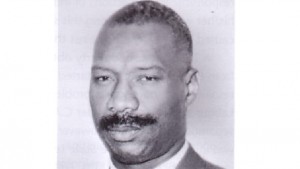
Robert Llewellyn Bradshaw 16th September 1916-23rd May 1978
Robert Llewellyn Bradshaw was born on the 16th September 1916 in St. Paul’s. His mother, Mary Jane Francis was a domestic servant, his father William Bradshaw was a blacksmith who migrated to the U.S.A when he was only nine (9) months old. Young Robert was brought up by his grandmother who ensured that he behaved himself and went to school. The family was far from being wealthy, there was no luxury but food was plentiful and fresh.
By age 16, Robert had attained three Seven Standard Certificates and had even taught as a pupil teacher for a short while before he went to Basseterre where he became a machine apprentice at the Sugar Factory. His mother was then caretaker of the guest house at the Factory and Young Robert moved in with her and got a glimpse of life at the managerial level. In the machine shop, Adam Claxton, a welder, suggested that the young man should join the Workers’ League. His membership was seconded by Harry Audain. However his career as a machinist did not have a chance to take off when in an accident in the machine shop Bradshaw injured his right hand and the doctors were unable to restore its full use. Bradshaw stayed in the tool room of the machine shop where he earned 2/3 per day but he also turned his attention to more academic pursuits. His mother paid for a correspondence course from England and two boys from the Grammar School who worked in the Factory Laboratory helped him with his studies.
1940 marked a turning point in Bradshaw’s involvement in the union. A strike for higher wages cost him his job and he was taken on at the Union as a clerk. Bradshaw also became the first secretary of the Sugar Factory Section of the Union and a member of the Executive Committee. In 1944, following Sebastian’s death, Bradshaw became Union President and vice-president of the Workers’ League and four years later the Union through the throes of the Thirteen Weeks Strike. The strike sparked off a Commission of Inquiry into the organisation of the sugar industry and Bradshaw was appointed to it. He visited England that same year in connection with the Commission’s report.
Bradshaw’s activities were not, however limited to the local scene. In 1945 he took part in the establishment of the Caribbean Congress of Labour and was elected its first assistant secretary. In 1947 he represented St. Kitts-Nevis-Anguilla at the “Closer Union” Conference for the amalgamation of the Windward and Leeward Islands and at the Montego Bay Conference which discussed the Federation of the West Indies. Two years later he participated in the establishment of the International Confederation of Free Trade Unions in Brussels and was elected to its first Executive Committee.
In the political arena, Bradshaw was elected along J.N. France and M. Davis to the island’s Legislative Council in 1946 and later became a member of the Leeward Islands General Legislative Council. He was again elected in 1952 when universal suffrage was introduced. In 1956, the advent of the ministerial system of government, Bradshaw was appointed Minister of Trade and Production.
In 1958 Bradshaw was elected to the Federal Parliament and held the position of Minister of Finance. When the Federation was dissolved in 1962, Bradshaw felt that “we were ruining the one great opportunity we had of making ourselves a recognizable grouping on a national scale in the world.” He returned to St. Kitts and re-occupied a place in the local legislature.
After the elections of 1966, he was sworn in as Chief Minister and on the 27th February 1967 he became the first Primer of the Associated State of St. Kitts-Nevis-Anguilla. The granting of Statehood opened the door to secession. Anguilla chose that way immediately and threw its lot in with Great Britain. Nevis lingered on, threatening to secede at anytime but Bradshaw remained committed to a unitary state and a West Indian Federation. In January 1975, Premier Bradshaw’s government took possession, by law, of all the estate lands in St. Kitts and in December 1976, his government successfully negotiated the take-over of the St. Kitts Sugar Factory. Premier Bradshaw had long been an advocate of independence for the State of St. Kitts, Nevis and Anguilla and when his Labour Party won all of the seats in St. Kitts in December 1975, he conducted independence talks with London in 1976 and 1977.
But by then Robert Bradshaw was a very sick man. He underwent major surgery in St. Kitts in 1976 and had to undergo another major operation in London in January 1978. He died on 23rd May 1978.
In 1998 the St. Kitts/Nevis Federal Parliament, passed the National Honours Act, which established standing national awards committee and three classes of award. These are the Order of National Hero, the Star of Merit and the Metal of Honour. The Act also established a National Hero’s Day. Members of the public are able to submit nominations for the awards, which are for citizens of the Federation who have given distinguished service to their country. Robert Llewellyn Bradshaw-First National Hero. The inaugural National Hero’s Day was held on the 16th September 1998 and first National Hero, the late Robert L. Bradshaw, was honoured.
